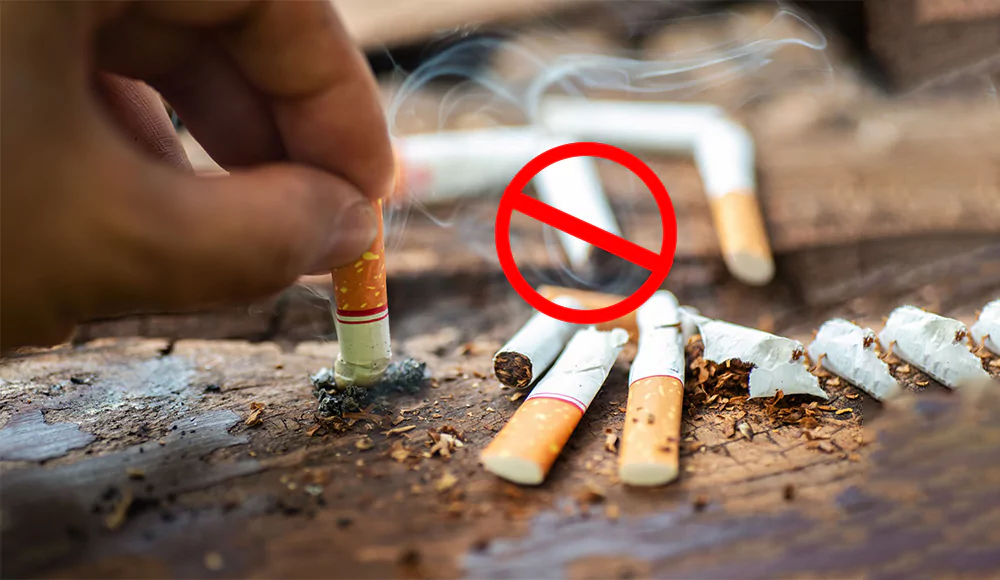
What Happens to You After Quitting Smoking?Quitting smoking is one of the best decisions you can make for your long-term health. While you may face short-term withdrawal symptoms such as headaches, constipation and insomnia, these are manageable with the help of a healthcare professional.
Smoking poses numerous health risks. It significantly increases the likelihood of developing serious conditions, like heart disease and cancer, even if it can lead to premature death. These risks provide a strong incentive to quit, although the process can be challenging due to withdrawal symptoms like headaches, irritability and intense nicotine cravings.
Despite the difficulties, the benefits of quitting smoking far outweigh the temporary discomfort. From the very first hours after you stop smoking to the many years that follow, your body begins to heal and recover from the harmful effects of smoking.
What Happens to Your Body After Quitting Smoking?
The positive effects on your health begin just 20 minutes after your last cigarette. Your blood pressure and pulse start returning to normal levels.
Moreover, the fibers in your bronchial tubes, which were previously hindered by smoke exposure, start moving again. This improvement aids the lungs by helping to clear out irritants and bacteria, reducing the risk of infection.
After 8 Hours of Not Smoking:
Within eight hours, your carbon monoxide levels will begin to normalize. Carbon monoxide, found in cigarette smoke, displaces oxygen in your blood, reducing the oxygen supply to your tissues.
As carbon monoxide levels decrease, your oxygen levels rise, helping to nourish tissues and blood vessels that were previously deprived of adequate oxygen while you smoked.
After 24 Hours of Not Smoking:
By the end of the first day, the nicotine in your blood drops to almost negligible levels.
At this point, reduced constriction of veins and arteries and increased oxygen levels enhance heart function, thereby lowering your risk of a heart attack.
After 48 Hours of Not Smoking:
By the 48-hour mark, damaged nerve endings begin to regrow, and you may notice improvements in your senses of smell and taste, which were previously dulled by smoking.
After 72 Hours of Not Smoking:
Within three days of quitting, you might find breathing easier as the bronchial tubes in your lungs relax and open up, facilitating better air exchange between carbon dioxide and oxygen. Additionally, your lung capacity increases, allowing your lungs to fill with more air.
After 7 Days of Not Smoking:
After a week without smoking, the carbon monoxide levels in your blood return to normal. Every attempt to quit smoking improves your chances of success, and reaching the one-week milestone is a significant step towards quitting for good.
After 2 Weeks of Not Smoking:
Within two weeks, you may notice easier breathing and walking due to improved circulation and oxygenation. According to the American Lung Association, your lung function can improve by as much as 30% around this time.
After 1 Month of Not Smoking:
In just a month, you will notice many positive changes from quitting smoking. Your overall energy levels will increase significantly. Symptoms related to smoking, like sinus congestion and shortness of breath during exercise, will diminish.
Additionally, the lung fibers that maintain lung health will start regenerating, reducing mucus buildup and protecting against infections.
Those who reach the one-month mark without smoking are five times more likely to quit permanently.
After 3 Months of Not Smoking:
Within three months of quitting, a woman’s fertility can improve, and the risk of having a premature baby decreases.
After 6 Months of Not Smoking:
Six months after quitting, you will likely find it easier to handle stress without the urge to smoke. You may also notice less mucus and phlegm production as your airways are less inflamed. Physical activities like walking become more manageable.
After 1 Year of Not Smoking:
After a year of quitting smoking, your lung capacity and function will have significantly improved. You’ll find it easier to breathe during physical activities and will cough less frequently. Additionally, you’ll save a substantial amount of money, potentially thousands of dollars, if you smoked a pack a day.
After 3 Years of Not Smoking:
Three years after quitting, your risk of heart disease is halved. Smoking restricts oxygen flow to the heart and damages artery linings, leading to fatty tissue buildup and increasing the risk of heart attacks and strokes. Quitting smoking helps reverse these effects and promotes heart health.
After 5 Years of Not Smoking:
Five years after quitting, your stroke risk is similar to that of a non-smoker. Additionally, your risk of developing mouth, throat, or voice box cancer is cut in half.
After 10 Years of Not Smoking:
After a decade, your risk of lung cancer is halved. The likelihood of developing other smoking-related cancers, including those of the mouth, esophagus, bladder, kidneys, and pancreas, also decreases.
After 15 Years of Not Smoking:
Fifteen years after quitting, your risk of a heart attack drops to that of someone who has never smoked. Reaching this milestone marks a significant achievement for your health and overall well-being.
Quitting smoking is one of the best decisions you can make for your long-term health. While you may face short-term withdrawal symptoms such as headaches, constipation and insomnia, these are manageable with the help of a healthcare professional.
Smoking poses numerous health risks. It significantly increases the likelihood of developing serious conditions, like heart disease and cancer, even if it can lead to premature death. These risks provide a strong incentive to quit, although the process can be challenging due to withdrawal symptoms like headaches, irritability and intense nicotine cravings.
Despite the difficulties, the benefits of quitting smoking far outweigh the temporary discomfort. From the very first hours after you stop smoking to the many years that follow, your body begins to heal and recover from the harmful effects of smoking.
What Happens to Your Body After Quitting Smoking?
The positive effects on your health begin just 20 minutes after your last cigarette. Your blood pressure and pulse start returning to normal levels.
Moreover, the fibers in your bronchial tubes, which were previously hindered by smoke exposure, start moving again. This improvement aids the lungs by helping to clear out irritants and bacteria, reducing the risk of infection.
After 8 Hours of Not Smoking:
Within eight hours, your carbon monoxide levels will begin to normalize. Carbon monoxide, found in cigarette smoke, displaces oxygen in your blood, reducing the oxygen supply to your tissues.
As carbon monoxide levels decrease, your oxygen levels rise, helping to nourish tissues and blood vessels that were previously deprived of adequate oxygen while you smoked.
After 24 Hours of Not Smoking:
By the end of the first day, the nicotine in your blood drops to almost negligible levels.
At this point, reduced constriction of veins and arteries and increased oxygen levels enhance heart function, thereby lowering your risk of a heart attack.
After 48 Hours of Not Smoking:
By the 48-hour mark, damaged nerve endings begin to regrow, and you may notice improvements in your senses of smell and taste, which were previously dulled by smoking.
After 72 Hours of Not Smoking:
Within three days of quitting, you might find breathing easier as the bronchial tubes in your lungs relax and open up, facilitating better air exchange between carbon dioxide and oxygen. Additionally, your lung capacity increases, allowing your lungs to fill with more air.
After 7 Days of Not Smoking:
After a week without smoking, the carbon monoxide levels in your blood return to normal. Every attempt to quit smoking improves your chances of success, and reaching the one-week milestone is a significant step towards quitting for good.
After 2 Weeks of Not Smoking:
Within two weeks, you may notice easier breathing and walking due to improved circulation and oxygenation. According to the American Lung Association, your lung function can improve by as much as 30% around this time.
After 1 Month of Not Smoking:
In just a month, you will notice many positive changes from quitting smoking. Your overall energy levels will increase significantly. Symptoms related to smoking, like sinus congestion and shortness of breath during exercise, will diminish.
Additionally, the lung fibers that maintain lung health will start regenerating, reducing mucus buildup and protecting against infections.
Those who reach the one-month mark without smoking are five times more likely to quit permanently.
After 3 Months of Not Smoking:
Within three months of quitting, a woman’s fertility can improve, and the risk of having a premature baby decreases.
After 6 Months of Not Smoking:
Six months after quitting, you will likely find it easier to handle stress without the urge to smoke. You may also notice less mucus and phlegm production as your airways are less inflamed. Physical activities like walking become more manageable.
After 1 Year of Not Smoking:
After a year of quitting smoking, your lung capacity and function will have significantly improved. You’ll find it easier to breathe during physical activities and will cough less frequently. Additionally, you’ll save a substantial amount of money, potentially thousands of dollars, if you smoked a pack a day.
After 3 Years of Not Smoking:
Three years after quitting, your risk of heart disease is halved. Smoking restricts oxygen flow to the heart and damages artery linings, leading to fatty tissue buildup and increasing the risk of heart attacks and strokes. Quitting smoking helps reverse these effects and promotes heart health.
After 5 Years of Not Smoking:
Five years after quitting, your stroke risk is similar to that of a non-smoker. Additionally, your risk of developing mouth, throat, or voice box cancer is cut in half.
After 10 Years of Not Smoking:
After a decade, your risk of lung cancer is halved. The likelihood of developing other smoking-related cancers, including those of the mouth, esophagus, bladder, kidneys, and pancreas, also decreases.
After 15 Years of Not Smoking:
Fifteen years after quitting, your risk of a heart attack drops to that of someone who has never smoked. Reaching this milestone marks a significant achievement for your health and overall well-being.
